
 *** If you like wacky, zany, and irreverent, then “Beetlejuice” is the show for you! This musical about death, dying, and ghostly hauntings features uplifting singing and dancing and often-crazed dialogue. The comedy is dark; the entertainment is light. This tale makes some sense in the first act but less in the second, although the underlying message is a good one. This is ultimately a coming-of-age story about a teenager who grieves the untimely loss of her mother. She’s upset that her father wants to remarry and give her a stepmother to help raise her. She is afraid that if she goes along with her father’s wishes—and they form a new family unit—then she might possibly forget the memory of her sainted mother who will always remain a part of her.
*** If you like wacky, zany, and irreverent, then “Beetlejuice” is the show for you! This musical about death, dying, and ghostly hauntings features uplifting singing and dancing and often-crazed dialogue. The comedy is dark; the entertainment is light. This tale makes some sense in the first act but less in the second, although the underlying message is a good one. This is ultimately a coming-of-age story about a teenager who grieves the untimely loss of her mother. She’s upset that her father wants to remarry and give her a stepmother to help raise her. She is afraid that if she goes along with her father’s wishes—and they form a new family unit—then she might possibly forget the memory of her sainted mother who will always remain a part of her.
Beetlejuice, or Betelgeuse, is really Beelzebub, the so-called prince of demons. In mythology, Beelzebub refuses to bow before God’s creature Adam and is thus cursed by God and becomes a fallen angel. In today’s production, Beetlejuice as Beelzebub is confounded with the star in the sky called Betelgeuse (pronounced Beetlejuice in English). This red giant is one of the largest stars visible to the naked eye—while Beetlejuice (Justin Collette) is also a star: As the demonic lord living between earth and the netherworld, he is the leading light of today’s show. His counterpart is Lydia Dietz (Isabella Esler, who has a wonderful singing voice). As a young teenager, Lydia can no longer conceive of her future now that her dear mother has passed away. She wants to be dead or, at least, experience what death must be like, since she misses her mother so much. In an unlikely series of events, the teen becomes the only human being who can see ghosts and interact with them. More specifically, Lydia sees Barbara (Megan McGinnis) and Adam Maitland (Will Burton), a married couple who haunt the house that her father Charles Dietz (Jesse Sharp) has recently purchased.
When Lydia interacts with the two ghosts, the three of them launch a plan to try to get Charles to move out of the house and, in the meantime, hopefully end his relationship with his wife-to-be Delia (Kate Marilley). Lydia cannot stand this new woman, in part because she could never replace her deceased mother. Beetlejuice is called in as a “bio-exorcist”, but he gets out of control. He’d rather kill off Charles in order for him to abandon the (haunted) house and not marry Delia. Plus, the demon wants Lydia as his wife, since she would no longer have parents or be subject to parental influence. Just like the story is about the locus between the world of the living and the dead, this show is also about how Lydia lives in between being a child and an adult. She wants to be free to make her own decisions and live her own life without the encumbrance of parents, and yet she still requires guidance. Although Charles is unable to adequately communicate his deep feelings to his daughter, he is actually a good man by intending to create a new family situation and bringing Delia into their lives. Just because Charles is not the perfect parent (and Delia may not be the best choice of stepmother) does not mean that he doesn’t want the best for his daughter. Although Lydia and her father would love to bring Emily back to life, Lydia has to learn the hard way that this is impossible. In the end, it’s the daughter’s love for both of her parents that makes her realize that her future life has meaning.
Although I am open to believing in ghosts, demons, and the supernatural, the deceptively attractive and entertaining veneer of this performance is somewhat too silly for my taste. But all that zaniness and illogic—plus Beetlejuice’s profane riffs on death, torture, and disobedience to God—is precisely why the story has lent itself to a cult following. On opening night, there were members of the audience wearing black and white striped clothing (and frequently ghoulish-looking hair and makeup to match) to resemble Beetlejuice, while some of the women wore all black lace dresses and fishnet hose to resemble Lydia. The cultists loved every moment: especially the funny uses of foul language, and there was wild applause throughout. In addition to the appeal to fringe culture, the show fascinates a mainstream audience as well, especially those familiar with the original fantasy horror movie of the same name from 1988.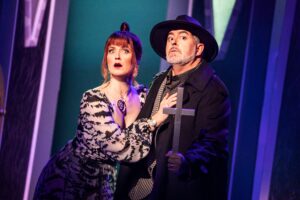
The directing by Alex Timbers could not have been better. The show was choreographed by Connor Gallagher, and dance captain Ryan Breslin has done a phenomenal job with the cast! Costumes by William Ivey Long are great! I especially loved the dancing skeletons and the dress that Delia wore with the black and white. In the beginning of the second act, we see several demons looking like Beetlejuice roaming around, dancing and singing—and wearing their characteristic black and white striped prison-like garb and green hair. Wig and hair design by Charles G. LaPointe and makeup design by Joe Dulude II could not have been done any better! David Korin’s scenic design is extremely compelling, especially when the demons’ outfits and the furniture in the room at the beginning of the second act match so splendidly. I liked how the interior of the house shifts between the décor that Barbara and Adam once had—to the comparative modern starkness of Charles’s taste—to the black and white room. In contrast, the attic is a generally stable locale but for the door to the netherworld. Movement from one set to another is smoothly and beautifully done! Incredible lighting by Kenneth Posner makes similar sets look very different from each other; the lights not only help to differentiate among scenes but also point up characters who are real from those who aren’t (that is, from the point of view of us earthly inhabitants). Very cleverly done is the book that glows yellow. Projection design by Peter Nigrini is innovative, particularly the series of yellow trapezoids against the dark blue background, representing what the netherworld could look like from the inside. In fact, the many trapezoids throughout the show—from the graphic design that opens the performance to the unusual tilts within the rooms—are skillfully conceived of. Sound design by Peter Hylenski works well, and the music and lyrics by Eddie Perfect could not be more… um, perfect? The music is produced by Matt Stine, supervised by Kris Kukul, and performed by a live orchestra, led by conductor, music director, and keyboardist Andy Grobensgieser.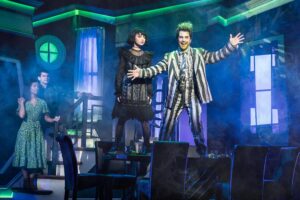
“Beetlejuice, The Musical” makes us ponder where the line is between the sacred and the profane. More importantly, it gets us thinking “Where do we go after we die?” and “Where do our loved ones go?” and “Can we join them?” Is there really a netherworld in addition to the world of the living? And can people in the form of ghosts span the divide between these two spheres of existence? And finally, is it ever possible for people to go back and forth: from being dead to being alive again? When we watch Beetlejuice prance on stage, we see how his blasphemy hits a nerve with most of the audience. In the meantime, we cannot help but take note of how Scott Brown and Anthony King’s script, based on the movie, speculates about the cusp of reality and brings out the sordid things that people will imagine when their souls are hurting. Being in the theatre has been likened to attending church, as both can be considered sacred spaces where the audience (or congregation) is temporarily removed from daily life in order to contemplate their place in the universe. In the last analysis, however, watching an array of talented actors sing and dance about life and death is preferable to pining about the irrationality of the human condition. By design, this musical helps us say adios to the morose!
“Beetlejuice, The Musical” is playing through November 19, 2023, at the Auditorium Theatre, 50 East Ida B. Wells Drive, in Chicago.
Tickets start at $47.50. Note that some performances are already sold out!
Group tickets for 10 or more are now on sale by emailing Broadway In Chicago Group Sales at groupsales@broadwayinchicago.com.
Performance schedule:
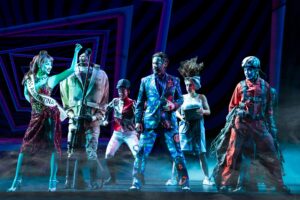 Tuesdays, Thursdays, Fridays – 7:30 p.m.
Tuesdays, Thursdays, Fridays – 7:30 p.m.
Wednesday, November 15 – 2:00 and 7:30 p.m.
Saturdays – 2:00 and 8:00 p.m.
Sundays – 2:00 p.m.
Extra performance – Sunday, November 12 – 7:30 p.m.
For more information or to purchase tickets, go to: https://www.broadwayinchicago.com/show/beetlejuice/.
To see what others are saying, visit www.theatreinchicago.com, go to Review Round-Up and click at “Beetlejuice, The Musical”


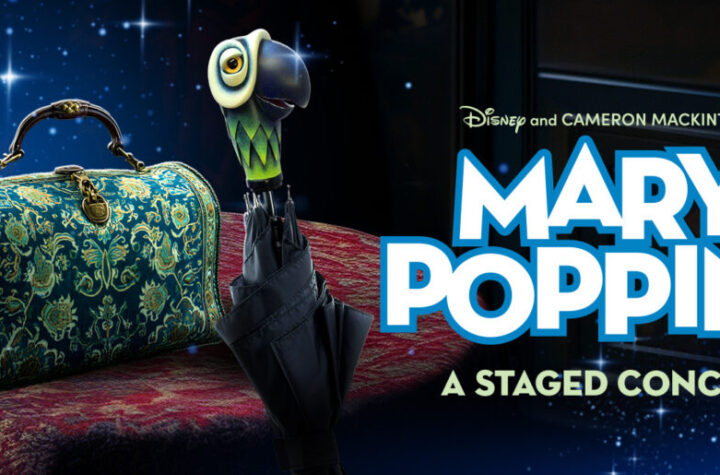
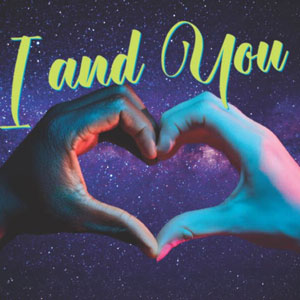
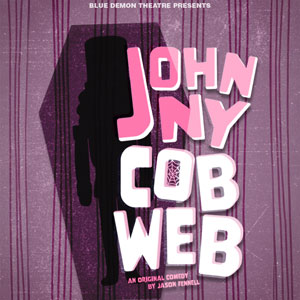
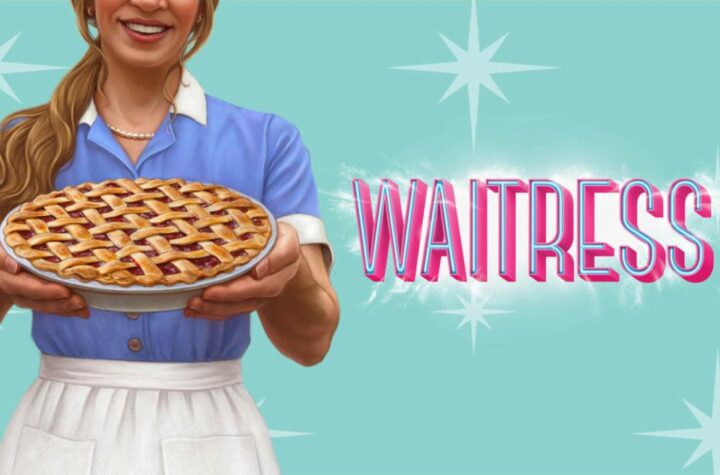
More Stories
“Mary Poppins : A Staged Concert” reviewed by Julia W. Rath
” I and You”
“Johnny Cobweb” reviewed by Mark Reinecke